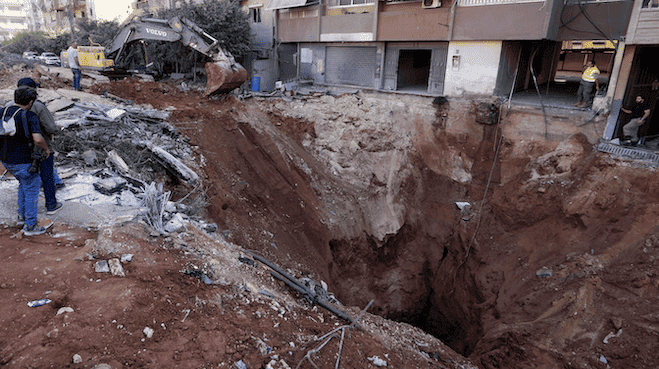|
إستماع
Getting your Trinity Audio player ready...
|
(Graveyard of Hassan Nasrallah. 90 feet underground)
*
Clumsy U.S. Diplomacy Has Undermined Israel’s Battlefield Successes Against Hezbollah and Linked Lebanon’s Political Fate with Syria
In 1982, the Israel Defense Forces swept through southern Lebanon, crossed the Litani River and moved into Beirut to uproot the terror infrastructure the Palestine Liberation Organization (PLO) had established in the country. Many PLO members, including PLO Chairman Yasser Arafat himself, went to ground.
Against the backdrop of Israel’s military success, the White House and State Department scrambled to end hostilities diplomatically. As Israel succeeded in devastating the PLO’s military positions, U.S. Envoy Philip C. Habib interceded to prevent the eradication of the PLO leadership. Habib’s mission was twofold: first, to facilitate Arafat’s exit to a safe haven and, second, to decouple Israeli policy from that of Lebanon’s newly elected president Bashir Gemayel. This would allow the State Department to remain more relevant, rather than have the parties essentially work things out themselves.
Gemayel’s willingness to normalize relations with Israel countered the narratives the State Department embraced in ways that diplomats could neither comprehend nor accept. While Habib succeeded in crafting a ceasefire, organizing Arafat’s exile, and returning Israeli forces to the Litani River, the outcome was disastrous for both Israel and Lebanon. Arafat continued to orchestrate attacks against Israel from exile, while Lebanon failed to secure a peace agreement with Israel and instead fell again under Syria’s influence, a result confirmed when Syrian agents assassinated Gemayel.
While the Israel Defense Forces focused on securing its northern border by eliminating key Hezbollah commanders, [U.S. Special Envoy Amos] Hochstein negotiated to protect the top leaders who sought refuge in Beirut.
Today, the pattern repeats. President Joe Biden’s defeatist instincts, coupled with the cautious approach of the incoming Trump administration, risk snatching defeat from the jaws of victory, much as occurred in 1982. Since October 2023, U.S. Special Envoy Amos Hochstein has worked tirelessly to shield Hezbollah’s leadership to prevent Israel from launching a full-scale ground incursion, even as daily Hezbollah rocket attacks forced the civilian evacuation of northern Israel. While the Israel Defense Forces focused on securing Israel’s northern border by eliminating key Hezbollah commanders, Hochstein negotiated to protect the top leaders who sought refuge in Beirut.
Eventually, Israel decided to ignore Hochstein and eliminate Hezbollah’s most senior figures. Hochstein then shifted his efforts toward the remaining Shia leadership, particularly Parliamentary Speaker Nabih Berri. The U.S. rationale was that Berri could broker a ceasefire with Hezbollah. This unnecessarily not only threw a lifeline to Hezbollah but also empowered one of its greatest allies and one of Lebanon’s most corrupt figures.
Israel may have changed the ground reality, but U.S. actions suggest that both the White House and State Department remain invested in maintaining Iran’s proxies in Lebanon. That may not be their stated intention, but it reflect an inability to see the forest for the trees. Hochstein even proposed a U.S.-supervised, Qatar-funded reconstruction plan for southern Lebanon to coincide with a concurrent effort to reintegrate former Hezbollah fighters into the Lebanese Armed Forces. Not only would this allow Hezbollah to siphon off funds and buy allies in regions it controls, but it also would allow them to continue to hollow out the only force charged with countering their rise.
These U.S. diplomatic efforts undermine Israel’s military achievements and grant political legitimacy to a weakened Hezbollah and its allies.
Meanwhile, other factions in Lebanon remain alienated and so look for other partners as the U.S. re-engages with Iran’s proxies despite Israel’s battlefield successes. Already, Druze leader Walid Jumblatt has traveled to Damascus to meet with Syrian rebel leader Ahmed al-Sharaa, while the Sunni masses cheer him and his rebel factions in Syria. Any hope of reviving peace talks with Lebanon now hinge on developments in Syria, whose future Turkey and Qatar, the regional sponsors of the Muslim Brotherhood, control. Once again, clumsy U.S. diplomacy has left Lebanon’s political fate intertwined with Syria.
President-elect Donald Trump’s involvement in Lebanon also has been less than helpful. The appointment of Massad Boulos, a former car salesman with scant local credentials, as the U.S. point man for Lebanon, is a misstep. Until recently, Boulos tilted toward President Michel Aoun’s movement, which in turn aligns with both Hezbollah and Syria’s fallen dictator Bashar al-Assad. Hezbollah’s new leadership now believes they can survive Trump and so will be far less likely to accept defeat.
The U.S. should refocus its efforts on Lebanon’s factions that are open to a full ceasefire, a return to the 1949 Israel-Lebanon Armistice Agreement, and the initiation of peace talks.
Trump should learn from the failures of Habib and Hochstein. With assistance from Gulf Arab nations, the U.S. should refocus its efforts on Lebanon’s factions that are open to a full ceasefire, a return to the 1949 Israel-Lebanon Armistice Agreement, and the initiation of peace talks. These groups, representing all of Lebanon’s communities—including moderate Shi’ite factions but excluding Hezbollah—are critical to lasting peace. The United States should demand Hezbollah’s permanent decommissioning and Berri’s retirement. To support a corruption trial for Berri’s wife Randa would signal to all Lebanese that the United States under Trump has turned a new page.
Trump and his Secretary of State nominee, Senator Marco Rubio, must also calibrate U.S. policy toward reality rather than wishful thinking. Excising Iranian influence is important, but stabilizing the region also requires preventing Turkey’s equally malign influence from filling the vacuum. Left to their own devices, the Lebanese people want peace with themselves and their neighbors. To allow any regional state to return them, as Turkey now seeks, into a combatant by proxy against Israel serves no one’s interest.


